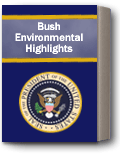
- Afghanistan
- Africa
- Budget Management
- Defense
- Economy
- Education
- Energy
- Environment
- Global Diplomacy
- Health Care
- Homeland Security
- Immigration
- International Trade
- Iraq
- Judicial Nominations
- Middle East
- National Security
- Veterans
- President's Cabinet
- USA Freedom Corps
- Faith-Based & Community Initiatives
- Office of Management and Budget
- National Security Council
- USA.gov
|
Welcome to "Ask the White House" -- an online interactive forum where you can submit questions to Administration officials and friends of the White House. Visit the "Ask the White House" archives to read other discussions with White House officials. |
|
|
July 14, 2004
Tom Sansonetti
Hi, I'm Assistant Attorney General Tom Sansonetti. I'm in charge of the Environment and Natural Resources Division here at the Department of Justice, under the leadership of Attorney General John Ashcroft. Coming to Washington D.C. from the West, some of my fondest memories are of times I have spent recreating outdoors with my family and appreciating the value of our nation's natural resources.
I understand how important it is to preserve the environment for the benefit of future generations. One of the primary responsibilities of my job is to enforce the federal civil and criminal environmental laws like the Clean Air Act and the Clean Water Act. Sometimes I also have to defend challenges to government programs and activities concerning the stewardship of public lands and the environment. Under the Bush Administration's watch, the Environment and Natural Resources Division has amassed an admirable enforcement record resulting in significant gains for public health and the well-being of all Americans. I'm glad that I can join you today, and I'm happy to answer your questions. Will, from Colorado writes: Tom Sansonetti Here at the Department of Justice, we've had a series of record-breaking years in environmental enforcement. In the last fiscal year, we won more than $203 million in penalties for civil violations of our environmental laws, the Environment Division's best year ever. In Fiscal Years 2001 and 2002, we recovered a record $7.95 billion in injunctive relief, which includes new and/or improved pollution controls on factories and legal commitments by polluters to clean up the messes that they have made. We recovered almost another $2.4 billion in Fiscal Year 2003, and this Fiscal Year is shaping up well too. We also obtained the largest civil penalty ever obtained under from a single company for violations of a federal environmental statute - $34 million - when we resolved a Clean Water Act enforcement action against Colonial Pipeline Co.
These record-breaking numbers demonstrate our commitment to strong enforcement of the environmental laws. Billy, from VA writes: Tom Sansonetti Virginia Electric Power Co. agreed to spend $1.2 billion between now and 2013 to eliminate 237,000 tons of sulfur dioxide (SO2) and nitrogen oxides (NOx) emissions each year from eight coal-fired electricity generating plants in Virginia and West Virginia. We are also continuing to bring new New Source Review cases. For example, earlier this year, we filed a lawsuit against Eastern Kentucky Power Cooperative for NSR violations.
We are also actively litigating our other cases, and have dates for liability trials next year in United States and State of New York et al. v. American Electric Power Co. et al. and United States v. Cinergy Corp. Stephanie, from Lander writes: Tom Sansonetti Approximately one half of those cases are enforcement cases where we are pursuing polluters and other violators of our environmental laws. The other half concern our obligation to defend the actions of virtually every federal agency when it comes to the environmental laws-these cases are non-discretionary.
Consequently, my point is that with finite resources of 400 attorneys and a $103 million dollar budget, the more defensive work that my attorneys must perform, the smaller number of enforcement cases I can bring. William, from Big Bear Lake
writes: Tom Sansonetti In March, 2003, Attorney General Ashcroft and I announced his priorities for civil enforcement of the environmental laws. One important priority was to level the corporate playing field so companies that do not comply with the law don't gain an advantage over those that do. Since then, we have settled with five other refineries: Lion Oil, Coastal Oil, Cenex, Ergon, and Chevron. The total refinery capacity now under consent decrees with the United States is about 40%. We are continuing discussions with other companies, and we hope to reach 50% during the remainder of this year.
By the way, there is a verification process-all consent decrees become court orders when they are approved and are publicly available. Consequently, they are also enforceable by the Justice Department.
Reese, from Casper writes: If so, how much of your day is spent on this problem? Can I, as a Wyoming citizen, assist you in this pending crisis? Tom Sansonetti Steve, from Oakland writes: Should there be concern in other areas of the state about this type of activity? Tom Sansonetti Defendants Alisal Water Corporation and the individual owners of the water systems were ordered to pay a penalty of $500,000 for violations of the federal Safe Drinking Water Act. The case involves privately owned drinking water companies serving 28,000 consumers in Salinas and other parts of Monterey County, California. As a result of our litigation, the court previously ordered the water companies to be run under court supervision.
This year, many of the systems were placed in the hands of reputable drinking water companies as a result of the government's action. We will continue to be vigilant in protecting the drinking water of Californians and all Americans. Dave, from Portland writes: Tom Sansonetti We worked with the Department of Commerce, Department of Justice, and EPA to determine the total cost of the cleanup and damage to birds, fish, and the shoreline. This suit was brought against Exxon by the United States and the state of Alaska.
The case eventually settled for $1.1 billion, which was the largest fine ever obtained by the federal government, even
today. I led the negotiations and signed the settlement on behalf of the Department of Interior during George H. W.
Bush's administration.
Mike, from Washington DC
writes: Tom Sansonetti Often, I do, indeed, take large cases to trial to achieve those results. For example, my attorneys took two very significant cases to trial against power plant operators (Ohio Edison and Illinois Power) under the Clean Air Act. Although we have to be fully prepared to litigate, it makes good sense to settle where we can obtain relief which is at least as good as the relief we could obtain through litigation.
An excellent example is the Colonial Pipeline Clean Water Act case, where we settled on the eve of trial and obtained a civil penalty of $34 million (the largest civil penalty ever under an environmental statute) and also imposed obligations on Colonial to continually maintain and monitor the integrity of its entire 5500 mile pipeline, which I mentioned in an earlier answer.
Brian, from Laramie writes: Tom Sansonetti Larry, from Orlando writes: flower from Peru into the U.S. because the flower was an endangered plant. I think taxpayer monies could be better spent on going after terrorists rather than gardeners. Tom Sansonetti One of the areas in which we are moving forward aggressively is our Hazmat Initiative that the Attorney General announced in fall 2003. Illegal transportation of hazardous materials (or "hazmat") can have potentially serious consequences for human health as well as the environment. We have thus targeted violators of the hazmat laws. For example, Emery Worldwide Airlines was the defendant in a major hazmat case in which it pled guilty to 12 felony violations of the hazmat laws; it paid a criminal fine of $6 million. With regard to your question about the orchid smuggling case, many people are not aware that smuggling of endangered species is one of the most lucrative forms of criminal trafficking after drugs and arms.
We take seriously our responsibilities to protect endangered species both here at home and under international treaties such as in the case you referred to. John, from Finland writes: Tom Sansonetti
Tom Sansonetti
|





